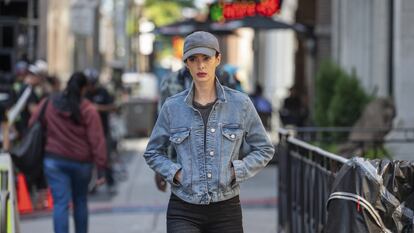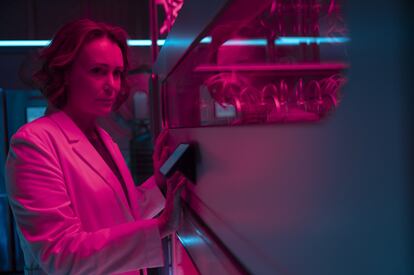‘Orphan Black: Echoes’ trades in the clones for human organ printing
Cult sci-fi series expands its universe with a sequel that delves into human identity


In the five seasons of sci-fi series Orphan Black (2013-2017), actress Tatiana Maslany played more than a dozen clones. As they tried to find out their true identities, they immersed in an intricate conspiracy in which their lives were at stake. The production, which introduced the world to the acting prowess of its protagonist, and for which she won an Emmy, among other awards, became a cult series and garnered a massive following. Its universe is now expanding with Orphan Black: Echoes, which is now streaming new episodes on AMC+. It’s another sci-fi tale that, just like the original, explores human identity and pushes today’s science to its limits.
In Orphan Black: Echoes, a woman wakes up with no knowledge of her past. Soon, she discovers that she is in a place full of cutting-edge technology where, she is told, human body parts are created with revolutionary, four-dimensional printing technology. “We didn’t want to go back to clones, we didn’t want to do the exact thing again. So, instead of exporting the conflict between nature and nurture, we opened it up a little bit more to the idea of how technology is becoming more and more part of our creation story,” says Anna Fishko, the series’ creator, in an interview by videocall. “We ask similar questions about what makes us who we are, but we wrap those in technology, which I think is very relevant, given where science is today,” she says.
With a slower pace than the original series, Orphan Black: Echoes puts its focus, in addition to scientific concerns, on the emotions of its characters. Although she wanted to put a distance between this and the original story (in fact, the new production is set in the future, in 2052), there will be some winks at the series’ origins, easily recognizable by fans, such as the return of certain characters. But, the scriptwriter stresses, it was important to the team that first-time viewers be able to understand the new series’ plot. That made writing it tough. “It’s always difficult trying to give everyone what they want. We tried to figure out what things we needed that people loved in the original series, and what things could connect the story to people who didn’t see [the original series]. And then, take into account what television is like today, ensuring that the series has a contemporary feel. It was tricky,” says Fishko.

Although it seems like fiction, the technology that appears in the series is based on reality. “We spent a lot of time talking with a scientist from Wake Forest University who runs a tissue printing lab, and he gave us some very interesting information. They’re making incredible advances in printing brain tissue, printing little hearts … I didn’t know it had come that far. They were fascinating conversations, but they were a little scary,” says the series’ writer and producer.
Actress Krysten Ritter (Jessica Jones, Breaking Bad) plays the new series’ protagonist in a role that is very different to the one that Maslany played. While her predecessor embodied a multitude of characters, with incredibly varied physical appearances, accents and personalities — at times, several of the clones would be on-screen simultaneously — Ritter is able to focus on playing a single character. She was chosen for her ability to combine toughness and vulnerability in her facial expressions, according to Fishko. “I was imagining someone who was a survivor, who had gone through something very difficult and who had found her way to building a whole new life. She had that toughness on the outside and a vulnerability on the inside, in search of connection and stability,” explains the writer. In the series, Ritter is joined by the British Keeley Hawes (The Durrells, Bodyguard) in a mysterious role that is related to the technological aspect of the story.
Fishko, who has worked on series like Fear the Walking Dead, Tyrant and Pieces of Her, says that for her, it’s more complicated to work with an existing universe when creating a new story, as she has done on this occasion, than to newly invent a fictional world. “There’s always a lot of people giving their opinion about how you have to deal with it. Also, this time we wanted to figure out how to honor the followers of the original series and the great work that they did with it. And I was working with some characters that people have already spent a lot of time with, and you have to think about how they would have changed in the 35 years that have passed in the story,” says the writer.
Sign up for our weekly newsletter to get more English-language news coverage from EL PAÍS USA Edition
Tu suscripción se está usando en otro dispositivo
¿Quieres añadir otro usuario a tu suscripción?
Si continúas leyendo en este dispositivo, no se podrá leer en el otro.
FlechaTu suscripción se está usando en otro dispositivo y solo puedes acceder a EL PAÍS desde un dispositivo a la vez.
Si quieres compartir tu cuenta, cambia tu suscripción a la modalidad Premium, así podrás añadir otro usuario. Cada uno accederá con su propia cuenta de email, lo que os permitirá personalizar vuestra experiencia en EL PAÍS.
¿Tienes una suscripción de empresa? Accede aquí para contratar más cuentas.
En el caso de no saber quién está usando tu cuenta, te recomendamos cambiar tu contraseña aquí.
Si decides continuar compartiendo tu cuenta, este mensaje se mostrará en tu dispositivo y en el de la otra persona que está usando tu cuenta de forma indefinida, afectando a tu experiencia de lectura. Puedes consultar aquí los términos y condiciones de la suscripción digital.








































